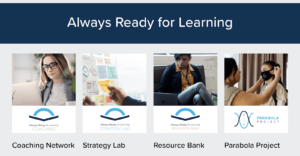Smart Cities: Phoenix

Like a half a dozen other cities, the EdTech scene has heated up in Phoenix over the last two years. In the coming weeks, Phoenix will host a couple key events. The ASU+GSV Education Innovation Summit is now the most important learning innovations conference on the calendar. After a day to catch up on email the Phoenix Startup Weekend EDU will be held April 25-27. Check below for details (and a discount).
Lay of the land. Sprawling across a desert valley, Phoenix is the opposite of Boston in many ways–the streets are straight, just about everything was built in the last generation, and there are not a handful of storied institutions of higher learning. The good news, according to Arizona State University President Michael Crow, is that you can do work here that you could not do anywhere else. People in Phoenix don’t care where you came from, they don’t make you jump through hoops.
ASU is not just important to Phoenix, with Crow’s drive to define a new American university, it is leading the transformation of higher education. ASU was named the first recipient of the American Council on Education Award for Institutional Transformation, an award that recognizes a college which — during a period of great change in higher education –has responded to challenges in innovative ways that allow the institution to thrive. Despite crippling cuts in state support, Crow is maintaining a value proposition while boosting relevance, support and employability with innovations like adaptive developmental math.
Gone are many traditional departments, replaced with centers that address the big questions of our time. Crow has changed the relationship with the faculty, redefined how the university functions, and–perhaps most importantly–changed how the university thinks about itself.
Going Online. ASU Online has more than 10,000 students, 70% undergraduate, with rapidly growing software and electrical engineering and engineering management degrees.
Phoenix is home to several for-profit colleges. The University of Phoenix–the largest of several Apollo Education Group subsidiaries –reached peak enrollment of almost 600,000 students in 2010 before being pummeled by federal regulations and negative publicity about debt loads, grad rates, and employability. Other Apollo subsidiaries include Western International University, which provides a low tuition, low service offering for better prepared students, and Balloon, a new marketplace for buying individual courses form a variety of providers.
Phoenix is home to the 40,000 student Grand Canyon University, the first for-profit publicly traded Christian college which, like University of Phoenix, offers online and onsite courses. As noted in July, GCU will open a second campus in Mesa and is eyeing other markets.
Serving more than 6,000 students, Primavera Online High School is Arizona’s largest school, and is powered by the integrated online solution Flipswitch. Other online options include Arizona Connections Academy and Arizona Virtual Academy.
EdTech. Companies in the Valley include:
- Parchment runs a leading transcript exchange and recently announced another $10 million in follow on funding. More than 3 million people and 8,300 institutions have used Parchment’s platform to collect, analyze and share more than 10 million transcripts and other credentials online.
- Edgenuity (formerly Education 2020), an online learning solution owned by the ever expanding digital learning group Weld North is headquartered in Scottsdale;
- Synergis Education has raised upwards of $33 million in funding led by University Ventures Fund to power campus, online, and hybrid programs for its 10 nonprofit college partners;
- StormWind led by corporate eLearning veteran Tom Graunke recently raised $5.5 million in follow on funding led by GSV Capital;
- Proctorio, changing exam administration through student identity validation, came in second in the LauchEDU comp at SxSWedu;
- Adaptive Curriculum, located on the ASU SkySong campus, develops secondary math and science content; and
- Learning Bridges in Chandler, provides aligned instructional support services.
- Several edtech leaders including Pearson, HotChalk, Blackboard and Sokikom have offices in metro Phoenix.
A Kauffman Foundation study found that Arizona ranked number one for startups per capita. Nearly a dozen business incubators and accelerators call Greater Phoenix home. Greater Phoenix Economic Council is a regional public-private partnership that actually pays attention to edtech as a growth sector.
“There’s a complete disconnect between districts and EdTech companies,” said experienced urban educator and grantmaker Steve Seleznow. “I would tell these companies, you bring tech in and we’ll be your testing ground.” Like every city reviewed in this series, school districts typically don’t interact productively with the tech community or leverage local edtech assets.
Mesa appears to be something of an exception; they have hosted an edtech conference and awarded innovation grants to teacher teams. Paradise Valley is another tech savvy district (see Cisco case study). Both districts have online schools that serve their students as well as students statewide.
Impact Investor. At the heart of the growing philanthropic community is the Arizona Community Foundation (ACF) led by Seleznow. The Arizona Venture Fund for Quality Education has $100 million in assets to to support a set of priorities including early learning, STEM, and entrepreneurship. The fund also supports advocacy groups including Stand for Children, Foster Ed, and Beat the Odds Institute.
“How do you become a great city? You make public, private, and corporate investments,” said Seleznow. He’s seen good examples up close–as the director of Venture Philanthropy Partners, he saw Mario Morino drive ecosystem in northern Virginia. “But, he adds, “this state didn’t invest in human capital and has been cutting for 30 years.” As a result Arizona is on the bottom of K-12 funding and leads the country in disinvestment in higher ed.
ACF is a member of Education Cities, a network of 31 urban investors and agitators leading a portfolio approach to improving educational options.
Cool Schools. There are 535 charter schools in the state, almost 200 in the urban core (with 70% free-reduced lunch students) but only 10 are ‘A’ rated. The New Schools for Phoenix initiative of the Arizona Charter School Association seeks to train 25 new school leaders for next-gen schools. “Over 10 years, we anticipate these 25 successful schools will replicate to create approximately 50 new A-rated charter schools in Phoenix,” said Executive Director Eileen Sigmund. “We’ve learned lessons from New Schools for New Orleans, Get Smart Schools in Denver, and CEE-Trust but made it a Phoenix initiative.”
There are handful of very good traditional charters including:
- Phoenix Collegiate Academy is a great middle school;
- Basis Charter Schools, chaired by Craig Barrett, are outstanding traditional schools but target middle income communities; and
- Great Hearts takes a Core Knowledge approach to humanities and has two campuses: Maryvale Prep (southwest) and Hilios (downtown).
Phoenix Union High School District runs 16 schools including Seleznow’s favorite Camelback High School led by TFA alumni, Dr. Chad Gestson. Camelback has a Montessori academy, AVID classes, an Advisory period, and a peer tutoring program called, “Success Is Mandatory.”
The Arizona Board for Charters is an independent authorizer with gubernatorially appointed members. To boost quality in the charter sector, they recently closed 10% of schools up for renewal–the bar has been raised.
Conclusions. I have spent much of the past two winters in Phoenix–enough time to begin to get a sense of the contours and the culture of the place. I love the desert landscape, warm February days, and the way they welcome newcomers. In some ways, it’s still the Wild West–that can be great for entrepreneurs but not so good for kids and families. Seleznow says state leaders “made conscious choices that worked in concert to increase rates of poverty and income inequality.”
Despite the efforts of ACF, recently activated group of advocates, Arizona received a D+ on the recently released Digital Learning Now state report card.
Openness to new ideas, smart impact investors, new school models, strong university presence, and a few high capacity districts suggests that Phoenix may be on the rise.
Coming Soon. Two upcoming events are worth checking out:
ASU/GSV Education Innovation Summit, April 21-23, 2014, Also known as “Davos in the Desert,” this conference brings together the world’s most visionary, passionate, and energetic players in the education innovation space.
SWEDU: Phoenix Startup Weekend EDU, April 25-27, 2014, Just as many of the above noted innovative education institutions have helped to support the next generation (see the number of entrepreneurs who started at Apollo or start-ups located at Skysong), the Valley has also rallied to help support Phoenix StartupWeekend EDU over April 25th – 27th. Hosted by Apollo Education Group and further sponsored by Pearson, FlipSwitch, Synergis Education, DLA Piper and Ingram Content/Vitalsource, this event will feature judges and speakers drawn from the executive ranks of these and other leading Phoenix education companies, foundations and school districts, the founder of Blackboard and CEO of Parchment Matt Pittinsky, education reform advocate Lisa Graham Keegan, Google Global Education Evangelist Jaime Casap, and yours truly.
The Weekend brings together students, educators, developers, designers, and startup enthusiasts to share ideas,form teams, build products or services, and launch nonprofits, school programs, and other kinds of startups! Tickets are still available here and all participants will benefit from coaching and sponsor prizes, including a scholarship to Tallwave’s Venture Blueprint bootcamp, a summer program to teach you more about starting a venture. Moreover, winning teams will receive support to take their idea to the next level, including free admission to SEED SPOT’s venture program and legal support from DLA Piper. And to readers of this blog, just enter “GETTINGSMART” at registration for a 25% discount: http://bit.ly/swphxtix).
Thanks to Chris Nyren and the Startup Weekend Edu crew for help updating this post.
Digital Learning Now, Pearson and Connections are Getting Smart Advocacy Partners.






0 Comments
Leave a Comment
Your email address will not be published. All fields are required.